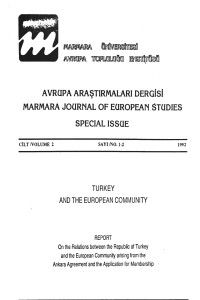Öz
The EEC Treaty lays down foundations for the Community becoming a Customs Union. Article 9 numerates the elements necessary to achieve a Customs Union, article 13 provides that customs duties on imports between member states must be abolished whilst Article 95 prohibits internal taxation on imports having an equivalent effect to customs duties. Goods benefiting from the right to free movement are the products originating from the member states as well as products coming from non-member countries which become goods in free circulation when the customs formalities have been complied with and the appropriate duties or charges having equivalent effect have been levied in the state of entry1. Subject to transitional provisions for any new member state the principles of the customs union are fully operational as directly applicable rules imposing specific obligations upon the member states as well as individuals. The only exceptions are the derogations justified according to Article 36 of the EEC Treaty, In a technical sense the customs union is achieved by the elimination of customs duties and charges having equivalent effect and the removal of quantitave restrictions and measures having equivalent effect. In addition the various obstacles to trade which have not been listed in the Treaty but form part of national practices must also be removed.
Kaynakça
- -
Öz
The EEC Treaty lays down foundations for the Community becoming a Customs Union. Article 9 numerates the elements necessary to achieve a Customs Union, article 13 provides that customs duties on imports between member states must be abolished whilst Article 95 prohibits internal taxation on imports having an equivalent effect to customs duties. Goods benefiting from the right to free movement are the products originating from the member states as well as products coming from non-member countries which become goods in free circulation when the customs formalities have been complied with and the appropriate duties or charges having equivalent effect have been levied in the state of entry1. Subject to transitional provisions for any new member state the principles of the customs union are fully operational as directly applicable rules imposing specific obligations upon the member states as well as individuals. The only exceptions are the derogations justified according to Article 36 of the EEC Treaty, In a technical sense the customs union is achieved by the elimination of customs duties and charges having equivalent effect and the removal of quantitave restrictions and measures having equivalent effect. In addition the various obstacles to trade which have not been listed in the Treaty but form part of national practices must also be removed.
Kaynakça
- -
Ayrıntılar
| Birincil Dil | İngilizce |
|---|---|
| Bölüm | Makaleler |
| Yazarlar | |
| Yayımlanma Tarihi | 29 Aralık 1992 |
| Yayımlandığı Sayı | Yıl 1992 Cilt: 2 Sayı: 1&2 |


